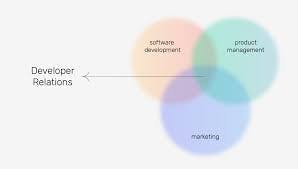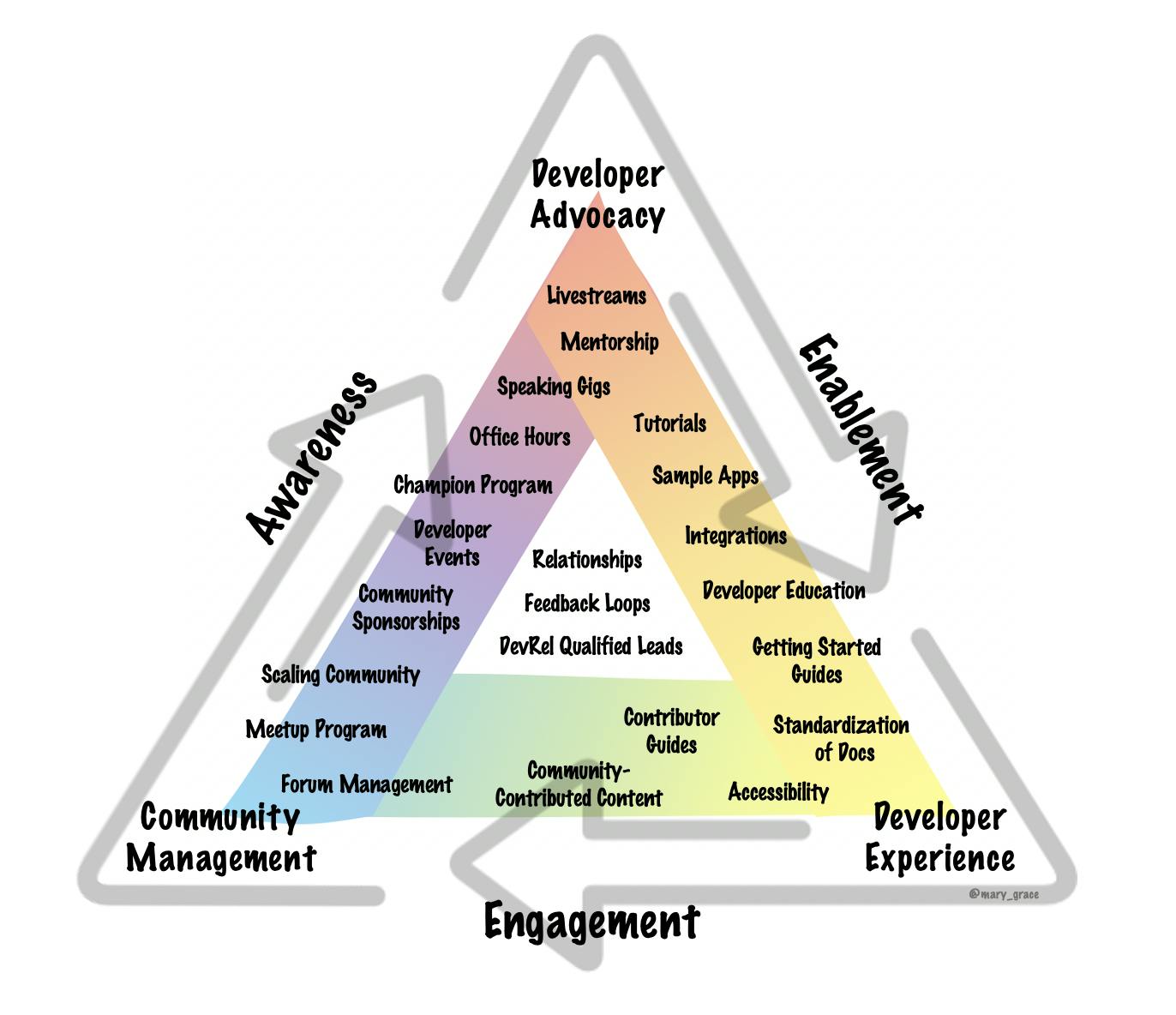The demand for Developer Relations professionals is soaring, making it an opportune moment for anyone to venture into the intriguing world of Developer Relations (DevRel).
Let's keep it real – breaking into DevRel isn't a walk in the park, and if it were as simple as a step-by-step guide, everyone would be on board. But for tech enthusiasts who practically breathe code, this role is unmatched.
But don't just take my word for it. Getting into DevRel can be a little tricky. Why? Because DevRel is still carving its path and has a multitude of roles that often overlap, defining it can be a bit tricky.
Worry not! This article is your go-to resource. I'm here to address some of your questions about DevRel and provide you with a practical roadmap to kickstart your journey.
Let's dive in!
What is Developer Relations?
Developer Relations, often abbreviated as DevRel, plays a pivotal role within companies targeting developer markets. It revolves around meeting the needs of developers, promoting software tools, and establishing a feedback loop between developers and product maintainers.
Unlike traditional marketing, DevRel doesn't focus on selling a product through flashy ads. Instead, it aims to foster an ecosystem around the product, emphasizing aspects like great documentation, building a helpful community, providing guides and tutorials, and facilitating user feedback.
DevRel professionals serve as a bridge between companies and developers. Their primary goal is to offer technical guidance, support, and resources, allowing companies to comprehend the needs and perspectives of their developer communities.
This understanding drives the growth and adoption of products and services. In essence, DevRel is about building and maintaining positive relationships between a company and its developer community.
The DevRel, acting as a liaison between marketing, engineering, and product teams, works to facilitate communication and collaboration, ensuring a conducive environment for developers to adopt and stick to a product.

What are the roles in DevRel?
In Developer Relations, various roles work together to build and maintain positive relationships with developers. Here's a breakdown of these roles:
Developer Advocates / Evangelists
These individuals champion the needs of developers, delivering their sentiments and feedback to the organization. Developer Advocates focus on maintaining a consistent feedback flow back to the company, ensuring that any issues are recognized. Evangelists, on the other hand, emphasize outreach and work to ensure the organization's perspective is well understood.
Developer Experience Engineers
Developer Experience professionals concentrate on enhancing the user experience for developers. They ensure all documentation is up-to-date and coherent, addressing any concerns that might make users cautious when using the product. Their role spans aspects like documentation, API surfaces, SDK design, and more.
Community Managers
Community Managers are responsible for fostering and maintaining a thriving community around a product. They incentivize users to form groups, provide quick feedback, and contribute to open-source projects if applicable. Building and sustaining a community helps reduce the burden on customer support and facilitates quicker user feedback.
Developer Marketers
Developer Marketing is focused on creating awareness among developers about the product and its capabilities. It ensures that the audience for the product increases over time and often overlaps with other DevRel roles.
Developer Educators/ Technical Writers
Developer Education is directly involved in creating content to help developers understand the product better. This includes guides, tutorials, videos, and other educational resources to facilitate learning.
Note that this is not an exhaustive list of everything that goes into Developer Relations, but they collectively contribute to the success of Developer Relations by addressing various aspects, from outreach and marketing to user experience and community building.
Each role plays a unique part in building a positive connection between the organization and the developer community.
What are the responsibilities of DevRel?
In the fast-paced tech industry, Developer Relations (DevRel) teams play a crucial role in fostering relationships between tech companies and developers. Here's a breakdown of their responsibilities:
Industry Recognition and Credibility: They speak at conferences, shows, and press events to gain industry recognition and credibility. They also develop and deliver presentations, sample solutions, and discussions to drive awareness and adoption of tech services.
Collaboration and Strategy: They collaborate with internal teams to define regional strategy and goals and support the developer community, user groups, and developer program initiatives.
Content Creation: They create and maintain relevant content, including demos, videos, blog posts, and screencasts, and cover tech services, emerging technologies, and industry developments.
Social Media Presence: They maintain a strong and credible presence on social media channels relevant to technical audiences.
Knowledge Sharing: Work with counterparts worldwide to share best practices and build a best-in-industry developer relations organization.
Partnership and Business Development: Partner with the business development, product, and engineering teams to support the expansion of partner and company businesses. They bring mutually beneficial products and features to the market.
Developer Journey Improvement: They improve critical developer journeys in developer-facing tech products.
In essence, DevRel's responsibilities encompass technical content creation, public speaking, community engagement, internal advocacy, developer programs, and initiatives.
DevRel professionals act as the face of the company, creating a buzz for products, troubleshooting technical issues, and presenting products at events and conferences.
Their goal is to build a strong and supportive developer community, ensuring that the company's products align with developers' needs and expectations.

What skills do I need to work in DevRel?
To thrive in DevRel, a combination of key skills is essential:
Community Building: DevRel professionals must excel at building and nurturing relationships with diverse developers. Strong interpersonal and communication skills are crucial.
Public Speaking: Effective communication of complex technical information during tech talks or webinars is a must.
Technical Writing: The ability to create accurate, informative, and engaging technical content, such as API documentation or blog posts.
Event Organizing: Skills in logistics, marketing, and event management are essential for organizing hackathons, webinars, and conferences.
Technical Proficiency: While not required to be an experienced developer, a passion for and comfort with new technologies is important. Understanding programming concepts and having development skills contribute to success.
In addition to these, having a technical background and experience in development enhances a DevRel professional's effectiveness. This technical knowledge is valuable for interacting with the development/engineering team, providing technical support to developers, and understanding the company's product.
Roadmap to becoming a DevRel
Navigating the path to becoming a Developer Relations (DevRel) professional involves several key steps:
Gain Technical Expertise: Develop a strong foundation in technology, especially in the field relevant to the company's product.
Build Communication Skills: Initiate communication by sharing learnings and experiences publicly. Actively engage in the community and be present on social platforms.
Hone Writing Skills: Cultivate effective writing skills, a fundamental aspect of DevRel.
Participate in Developer Communities: Join online forums, attend events, and contribute to open-source projects to connect with the developer community.
Create a Portfolio: Showcase your expertise through content creation like blog posts, presentations, and videos.
Leadership and Speaking Opportunities: Seek chances to lead or speak at events, participate in hackathons, and organize meetups to enhance leadership and speaking skills.
Apply for DevRel Positions: Look for DevRel roles that aligned with your interests and goals. Reach out to DevRel professionals for guidance and advice.
Continuous Skill Development: Stay curious and updated with the latest trends and technologies in the field.
Remember, this roadmap serves as a general guide and may vary based on specific company requirements. The key is to continuously develop technical expertise, refine communication skills, actively participate in the developer community, and stay adaptable to evolving trends in DevRel.
Conclusion
A career in Developer Relations (DevRel) requires a unique blend of technical proficiency, community building, content creation, effective communication, and empathy.
To thrive in this rapidly evolving field, foster a commitment to continuous learning and actively cultivate the skills essential for strengthening connections between developers and tech companies.
For those intrigued by technology and community dynamics, entering the field of DevRel is a strategic move. By mastering coding, forging connections, engaging in public speaking, and embracing a perpetual learning mindset, you can carve a meaningful path in DevRel, contributing to technological innovation and leaving a lasting imprint on the developer community.
